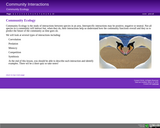
Introduction to community interactions for AP Biology.
- Subject:
- Biology
- Life Science
- Material Type:
- Lesson
- Author:
- Deb Henry
- Date Added:
- 03/19/2018

Introduction to community interactions for AP Biology.

A family moves into an unpopulated area. With the ingenuity of one young girl, a town is established and grows. The idea of supply and demand is evident in this story. The businesses in town grow to include a tanner, a cooper, a miller, a blacksmith and a laundry.

Through site-specific client-based work, this course will allow students to materially contribute to redevelopment decision-making regarding a former inner-city industrial site. The course will focus on generating and analyzing pragmatic redevelopment scenarios given the issues of brownfields and environmental contamination, community preferences, regulatory constraints and economic realities.
The course is designed along two parallel and mutually reinforcing educational tracks: Field learning and classroom reflection, with ample time built into the schedule for both. As the course will focus on an actual site, there will be a sizeable portion of student time spent on location and in the surrounding community.

In this activity, students will discuss giving and receiving directions, as well as talk about events within a community.
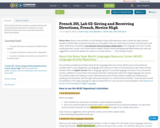
In this activity, students will discuss giving and receiving directions, as well as talk about events within a community.
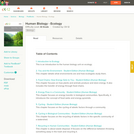
The Ecology Student Edition book is one of ten volumes making up the Human Biology curriculum, an interdisciplinary and inquiry-based approach to the study of life science.

Drama combines the literary arts of storytelling and poetry with the world of live performance. As a form of ritual as well as entertainment, drama has served to unite communities and challenge social norms, to vitalize and disturb its audiences. In order to understand this rich art form more fully, we will study and discuss a sampling of plays that exemplify different kinds of dramatic structure; class members will also participate in, attend, and review dramatic performances.

The MIT Biology Department core courses, 7.012, 7.013, and 7.014, all cover the same core material, which includes the fundamental principles of biochemistry, genetics, molecular biology, and cell biology. Biological function at the molecular level is particularly emphasized and covers the structure and regulation of genes, as well as, the structure and synthesis of proteins, how these molecules are integrated into cells, and how these cells are integrated into multicellular systems and organisms. In addition, each version of the subject has its own distinctive material.
7.014 focuses on the application of these fundamental principles, toward an understanding of microorganisms as geochemical agents responsible for the evolution and renewal of the biosphere and of their role in human health and disease.
Acknowledgements
The study materials, problem sets, and quiz materials used during Spring 2005 for 7.014 include contributions from past instructors, teaching assistants, and other members of the MIT Biology Department affiliated with course 7.014. Since the following works have evolved over a period of many years, no single source can be attributed.

The online training programme for activities and specialized educators aimed at introducing how to use the methodology and tools developed under the project : It targets youth activists and specialized educators who want to involve youth people in civic participation projects, with the goal of training more youth activists and educators.
You will find a Guide for the promotion of youth civic participation at the local level: this guide has different objectives, first of all to involve youth at risk and keep them involved, then to diagnose the needs of local communities, and finally to understand and cooperate with the local institutional context.
And a training programme for YOUNG PEOPLE involved in civic participation projects: the program targets youth-at-risk and contains lesson plans and related materials that youth activists and educators can use to train and guide youth-at-risk involved in local change projects.
This training is doable online with quiz to assess the progress of each students.
It is free.
YOUC project for Promoting Youth Participation in Local Communities is aimed at young activists, youth workers, educators and organizations who want to promote the empowerment, initiative and civic participation of young people at risk of marginalization.
The project is based on a methodology and a set of tools to promote youth participation and active citizenship at the local level of young people in difficulty supported by groups of young activists and volunteers, as well as educators from associations in each partner country.
YOUC project supports the capacity building of youth leaders and educators by providing them with an effective methodology and tools to reach marginalized youth and involve them in local civic participation. For the same reason, the project focuses on the horizontal management of the professional development of youth workers.
YOUC aims to:
• Promote the activation of NEETs
• Improve the level of key competences and skills of young people, in particular the European key competence social and civic responsibility
• Promote the participation of young people in civil society
• Promote inclusion and solidarity
The European Commission’s support for the production of this publication does not constitute an endorsement of the contents, which reflect the views only of the authors, and the Commission cannot be held responsible for any use which may be made of the information contained therein.

Advertises itself as "instant access to tens of thousands of classroom-ready, digital resources." Videos, games, audio clips, photos,lesson plans, etc.
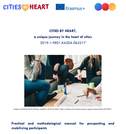
The Intellectual Output “Practical and methodological manual for prospecting and mobilizing participants” is aimed to make the link between the profile of participants, their history and the skills required to accomplish the project mission; to search and find potential participants; to show that it is possible, when spotting potential participants; to consider their background, skills and profile at once; to explain how it is possible to recruit participants based on all the above elements; to highlight the main difficulties encountered by the partners, as well as the keys to success and the developed solutions. This document is available in 6 languages and can also be download in other languages then english on : https://citiesbyheart.aeva.eu/index.php/portfolios/io1/
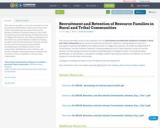
This resource provides access to the materials from the Recruitment and Retention of Resources in Rural and Tribal Communities group session hosted by the Northern California Training Academy in July of 2017. Developed in partnership between the National Center for Diligent Recruitment, the California Department of Social Services, and the Northern California Training Academy at the UC Davis Extension Center for Human Services, this two day group session provided sustainable gains including formation of new partnerships, identification of new solutions, and specific strategies toward improving recruitment and retention of resource families in rural and tribal communities.

In this realistic fiction story, young childrens powers of imagination create the town of Roxaboxen filled with houses, buildings, and stores. Years later, these friends reflect on the memories of their special town.
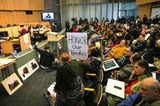
Local governments are the smallest and closest governments to us. They are usually the first place we turn when we need help. This is the teacher guide companion to The State We're In: Washington (Grade 3-5 Edition) Chapter 6. The resource is designed to engage students with a launch activity, focused notes, and a focused inquiry.

Unlike film, theater in America does not have a ratings board that censors content. So plays have had more freedom to explore and to transgress normative culture. Yet censorship of the theater has been part of American culture from the beginning, and continues today. How and why does this happen, and who decides whether a play is too dangerous to see or to teach? Are plays dangerous? Sinful? Even demonic? In our seminar, we will study plays that have been censored, either legally or extra-legally (i.e. refused production, closed down during production, denied funding, or taken off school reading lists). We’ll look at laws, both national and local, relating to the “obscene”, as well as unofficial practices, and think about the way censorship operates in American life now. And of course we will study the offending texts, themselves, to find what is really dangerous about them, for ourselves.